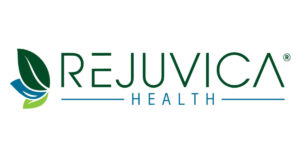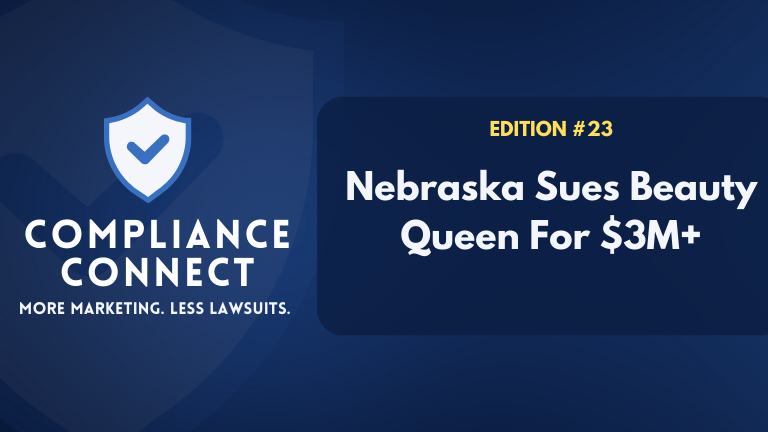Good morning! This is the twenty-third edition of the Compliance Connect newsletter.
The goal is simple: to keep you in the loop on what the FTC and other regulatory agencies are up to so that you can protect yourself.
These newsletters will land in your inbox twice a week – Mondays and Thursdays.
Remember: this is NOT legal advice, only information!
Here’s the rundown today…
- 👉 Nebraska Influencer Sued For Dropshipping Program
- 📞 Good News On Unwanted Calls
- 💊 FTC Goes After Health Product
- ❤️ Can Your Charitable Donations Get You In Trouble?
- 🔵🔴 How Many Republicans And Democrats Are On The FTC?
Compliance Digest: What You Should Read Today
Nebraska Beauty Queen Faces Lawsuit Over Deceptive Marketing
Social media influencer and current Mrs Nebraska, Elizabeth “Liz” Friesen, was sued last week by the Nebraska Attorney General for misleading customers about a dropshipping program.
According to the complaints, Friesen and the other defendants…
- Misled consumers by promising “financial freedom” through various “passive income” services
- The main service was a done for you Amazon and Walmart dropshipping stores.
- They flaunted a high-end lifestyle and implied that buyers of this program will get rich as well.
- In reality most customers lost money, with some losing over $100,000.
According to the complaint, this misleading advertising resulted in more than $3 million in lost savings for Nebraska consumers”
The complaint features many examples of the kinds of violations we talk about in this newsletter – implied and express income claims, misrepresentations, misleading testimonials and more.
Another interesting part of the case is that the state is trying to collect damages from the Friesen herself, claiming that she did not treat her corporation like a separate entity.
You can read the full complaint here.
This is another reminder that states are a real threat to to marketers who use non-compliant marketing.
Reports Of Unwanted Calls Down By 50%, According To The FTC
The FTC reports that complaints about unwanted telemarketing calls have dropped by more than half since 2021, with robocalls seeing a steady decline for the third straight year.
The agency’s efforts include cracking down on illegal telemarketing through initiatives like Operation Stop Scam Calls and expanding protections under the Telemarketing Sales Rule to address new threats like voice cloning scams.
Complaints about medical and prescription-related robocalls were the most reported issue, while reports about imposters and debt-reduction scams also ranked high.

Case Breakdown: Rejuvica
This is a case from 2023.
Rejuvica LLC marketed an herbal supplement called Sobrenix, claiming it could reduce alcohol cravings and help manage alcohol consumption.
The company advertised its product via websites, Amazon, and even staged appearances on television.
The FTC accused Rejuvica of using deceptive marketing tactics to promote Sobrenix as an effective solution for alcohol use disorder, a condition that requires evidence-based treatment.
The FTC’s claims were denied by Rejuvica. Here is their response.
Here’s What the FTC Says Rejuvica Did Wrong…
#1 – Misleading Advertising Claims
Rejuvica claimed that Sobrenix could reduce alcohol cravings, help users regain control of their drinking, and even treat alcohol use disorder.
The problem? These claims were not supported by reliable evidence.
The FTC points out that promoting a product as a treatment for a disorder without scientific backing is misleading and violates Section 12 of the FTC Act, which focuses on food, drugs, devices, services, and cosmetics.
In addition, the defendants were accused of violating the Opioid Addiction Recovery Fraud Prevention Act – which focuses specifically on any substance use disorder treatment service or substance use disorder treatment product.
#2 – Fake Review Websites
Rejuvica created websites like “AlcoholSupportSupplements.com” to appear as independent review platforms.
These sites ranked Sobrenix as the best product, but they were owned and operated by Rejuvica itself.
These “reviews” misled consumers into believing the endorsements were unbiased, violating FTC’s rules on advertising disclosures.
#3 – Misrepresentation Through Spokespersons
Rejuvica paid health “experts” to promote Sobrenix on TV shows.
However, they did NOT disclose that these appearances were advertisements, creating the impression that the product was endorsed by independent professionals.
The Settlement
The FTC and Rejuvica agreed to a settlement. The highlights were…
- $650,000 for customer refunds.
- Defendants agree to not make any more unsubstantiated claims
Click here to read the full complaint.
Did You Know…
There are 5 FTC commissioners. 3 are from the president’s party while 2 are from the opposition party.

Quick Compliance Tip: Charitable Donations
Many marketers tout their charitable work in their marketing. This isn’t illegal, but some marketers use it in a non-compliant way.
It comes down to whether your charitable contributions are REAL.
Far too many marketers claim to make donations, but don’t.
If you declare publicly that you’ve donated to causes or done philanthropic work, make sure to document it and have substantiation.
They even raise the money from their audience and actually never donate! This is wrong on MANY levels, least of which is that it can expose you to lawsuits from more than just the FTC!
Secondly, assuming you do make donations, don’t embellish or exaggerate them to make yourself look better.
Using public work as a marketing tool is heavily audited in regulatory investigations. It gets special attention.
Finally, keep proof of what you say. SPECIFIC and ACCURATE proof.
If you do charitable work, that’s amazing. Please continue.
If you decide to use that charitable work as a marketing tool in your promotions, please be careful.
